Nerine Dorman's Blog, page 17
January 13, 2022
Hidden Karoo by Patricia Kramer and Alain Proust
I make no secret of the fact that South Africa's arid interior is my 'heartland'. My father was born in the Groot Karoo, and at times lived in little dorpies like Aberdeen, Hanover, and De Aar. During the holidays, when most sensible folks head to the beach, we head to the hinterlands, and the Klein Karoo, especially the area near Ladismith and Oudtshoorn, is high up on my list of favourite destinations. When Hidden Karoo by Patricia Kramer and Alain Proust landed on my review pile, I was immediately all grabby-fingered over the book.
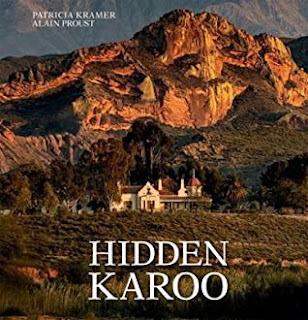
And for very good reason. On a long road trip through the interior, it is so easy to dismiss the landsdape when all one sees passing by in a blur of windpumps, scatterings of sun-bleached sheep, flat-topped koppies, and long stretches of what at a glance appears to be a Martian wasteland. Yet if you harbour a love the history of South Africa's dry hinterlands, or are idly curious and wish to know more, then this book will be for you. Those in the know understand that if you take the time to step off that highway, and spend a little time off the beaten track, you'll fall irrevocably in love with the land, its people, its nature, and its history.
Hidden Karoo is not only informative, but it really *is* a beautiful book, filled with stunning photographs, bits of history and architectural detail, and plenty of information to get you planning your next road trip. The authors have divided the Karoo into a variety of regions, each of which is treated in a chapter, from the Tankwa in the west, the dry interior, and all the way east to the Camdeboo.
South Africa's history is incredibly complex, the stories often painful when one examines the role colonisation and war played in shaping our nation. And by the same measure, we are left with a rich melange melding indigenous and European, in a way that is wholly unique and captures the imagination. Hidden Karoo takes you on a journey through time, to Loeriesfontein's collection of windpumps; ancient petroglyphs near Vosburg; British blockhouses of the South African War; outsider artist Helen Martins's Owl House in Nieu Bethesda... I can go on.
This book is a must-have for anyone who loves travel, loves South Africa, and wishes to dig a little deeper into some of the cultural and natural history of a region redolent with contrasts and ancient magic, and I cannot recommend it enough.
January 7, 2022
Making Sense by Sam Harris
I've been listening to Sam Harris's podcast on and off now for quite a few years. For those who don't know him, he's an American philosopher and neuroscientist who's possibly best known for unpacking many hot-button topics. Obviously, this has earned him a fair amount of criticism from certain quarters, but it doesn't detract from the manner in which he approaches his rational inquiries. Whether you agree with him or not, I still feel that he often raises points that are worth turning over.
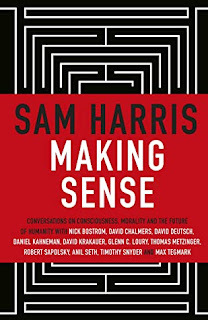
Making Sense is a selection of discussions that appeared on his podcast, and features the likes of Nick Bostrom, David Chalmers, David Deutsch, Daniel Kahneman, David Krakauer, Glenn C Loury, Thomas Metzinger, Robert Sapolsky, Anil Seth, Timothy Snyder, and Max Tegmark. All these contributors are specialists in their fields that range from philosophy and physics to neuroscience and history.
Some of what is covered includes consciousness, notions of the self, the nature of knowledge, intelligence (and AI), ethics, and a range of topics that slot in among these bigger pictures. I'll admit straight up that some of the discussions strayed into territory that I found incredibly challenging, but I'm also a big champion of reading outside of my comfort zone, so this hefty tome most certainly presented a worthy investment of my time that stretched my grey matter a fair bit. So, perhaps a word of caution – this is not an easy read for the average person (like me!).
My biggest takeaway from Making Sense is that as a species we need to be able to take a collective view that is broader and more objective, and to be especially aware of how easy it is for us to remain within the parameters that are 'easy' or 'less effort'. From what I can glean, there are many exciting developments in the worlds of computer programming and neuroscience, and especially so where the two fields are starting to overlap in the development of AI. It's interesting to see also how the experts in these fields often disagree with each other, but most important is Harris's emphasis on ethics, rationality, and growing an understanding not just how we think, but how we share the collected wisdom for future generations.
This is most certainly a book to delve into again in the future, especially to see how things might have developed since then. Harris and his contributors often engage in lively debate, and it's good to see some of that flavour translate from the spoken to written word.
January 6, 2022
The Lions of Al-Rassan by Guy Gavriel Kay
I have no idea why I've waited so long to read Guy Gavriel Kay's fiction. He keeps getting mentions from some of my favourite authors, so I'm ridiculously glad that I've finally made the effort to pick up his writing. I stumbled across The Lions of Al-Rassan in one of my local second-hand bookstores, and it languished on my bookshelf awhile longer.
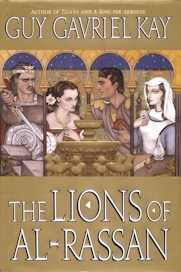
I won't lie. There's a lot to unpack with this novel. Kay mentions in an interview* that he became interested in examining historical times through the lens of the fantastic, and the way that we can glimpse particular world views through the lenses of the characters. And that's exactly what he does with The Lions of Al-Rassan, which is a book that's going to stay with me for a long, long time and begs that I revisit it at some point in the future, as there is no doubt much that I missed on the first read through.
At its heart, this is a story inspired by the Reconquista, and examines how people, when possessed by strong ideologies, will act when greater forces are at play. Most of the conflict plays out between the kings of Esperaña, who worship the sun god Jad, and the slowly crumbling Cartada empire, that is past its prime and inhabited by the Asharites who worship a stellar deity, Ashar. Each social group sees itself as having the right of things, and the lunar-orientated Kindath – a landless people much like our Jewish folks – are caught between greater powers and often turned into convenient scapegoats.
Yet there is a basic humanity at play, too. Esperañan military leader Rodrigo Belmonte serves his king, but falls out of favour, and his path crosses with the infamous Asharite poet and assassin, Ammar ibn Kharian. An unlikely friendship is forged, but tension remains, and caught betwixt them is the intelligent, talented Kindath physician Jehane bet Ishak.
Much like Scott Lynch, Kay writes with a remote third-person verging on omniscient, and succeeds so incredibly that I will hold him up as an example for those wanting to see how this somewhat tricky writing style can be done, and done well. His writing harks more to the measured, classic style akin to Tolkien rather than the fast-paced fantasy that's deemed popular these days. As a guide, I'd also recommend him to people who enjoy Robin Hobb. Kay often turns over the kinds of ideas that are difficult, if not impossible, to discuss in polite company (or on social media, for that matter). But he brings these themes, many of which are pertinent to today's current issues, with empathy and nuance. His characters are incredibly well realised, and although not always likeable, they are deeply fascinating. He does not shy away from depicting violence, either, so if you are squeamish, perhaps skip those pages.
A word of caution if you're new to Kay's writing: there are many names, much exposition (beautifully handled), and much nuance, that is difficult to parse at first. But Kay is a master of weaving, and if you are a patient reader, willing to slow your pace, persevere, and allow the words to carry you along, you may well find yourself enchanted like I was.
The Jewel of Seven Stars by Bram Stoker
The Jewel of Seven Stars by Bram Stoker was included in my Audible subscription, so in the cause of dipping into more of the Gothic literary classics, I gladly gave this one a listen. People tend to overlook Stoker's other works, which are overshadowed by the perennial favourite, Dracula. I do think it important to offer a little context for The Jewel of Seven Stars, which came about during the time when much of Europe was in the grips of Egyptomania during the twilight years of the British Empire. Many wonderful archaeological discoveries were being made in Egypt during this time, which deeply fascinated many, and most certainly also inspired imaginations and sparked myriad esoterically minded folks to flavour their approaches to mysticism. Which is a completely different topic for another time.
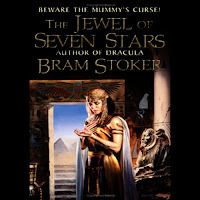
The Jewel of Seven Stars is also very much a product of its time, deeply embedded in the culture of British Imperialism and Victorian sensibilities (hah). And yet, as I've observed in Dracula, there's a subtle current of feminism at work – this time expressed in the characters Margaret Trelawny and the fictional ancient Egyptian queen Tera.
Margaret is the precocious daughter of the Egyptologist Abel Trelawny, and she is no shrinking violet, even though the men around her try to pull the usual stunt of treating her like a delicate bloom. Queen Tera ruled thousands of years ago, and not only was she a woman ruling as pharaoh in a traditionally male-dominated society, but she was a powerful sorcerer who held sway over the material and unseen worlds. So feared was she, that when she was eventually interred, great pains were taken to ensure that no one went near her tomb.
Fast forward a thousand centuries or so, and Tera's eternal slumber is indeed disturbed when explorers carry off her mummy and grave goods, thereby unleashing a powerful curse (a theme often exploited in media related to ancient Egypt). We follow the story primarily from the first-person narrative of Malcom Ross, a barrister upon whom Margaret calls to help solve the mystery of the ailment that strikes her father. We also dip into the journal of an explorer who first describes the ominously named Valley of the Sorcerer, where Tera is entombed.
What follows is part attempted-murder mystery, part-horror, as Malcolm, Margaret, and others, try to discover what forces threaten Abel. We are transported from the logical world Malcolm is accustomed to, to a milieu of unquiet spirits, malevolent mummies, and magic. In my research, I discovered that Stoker wrote two endings for this book, and I'm glad that this edition has the happier one (although the first ending he wrote is entirely delicious in its own way). I do feel that the second ending is not as powerful or cataclysmic as that in Dracula, but this is nonetheless an intriguing and engaging novel that will entertain lovers of Gothic literature. To close, Simon Vance is a wonderful narrator, and he did a lovely job with this edition. I'll certainly be hunting down more of the works he's read.
December 30, 2021
Dracula (Audible edition) by Bram Stoker
As part of my continued campaign to revisit classics, I chose to dip into this perennial Gothic favourite by giving the Audible edition of Bram Stoker's Dracula a spin. Then again, who can go wrong with this wonderful cast, including Alan Cummings, Tim Curry, and the late veteran audiobook reader Katy Kellgren, among others.

I think it's safe to say that most of us have seen the movies and series inspired by Stoker's work, but so far few of them have been able to capture the depth and breadth of the source material. I first read Dracula in high school, and I admit freely that many of the subtler undercurrents went way over my head. Also, having just gone through Mary Shelley's Frankenstein, and with the work fresh in my mind, I can compare these two classics within the Gothic genre better. Each is quite a different beast, and while there is, in my opinion, more emotional and philosophical weight to Shelley's writing, there is, nonetheless, an astonishing attention to detail in Stoker's work.
Perhaps what makes this edition all the more special is the way that it cleaves to its epistolary nature by employing different readers to take on the letters and diary entries of the characters, imbuing each with their particular flavour and tone. In that way, Audible Studios has done well in their creative decisions. It's easy to close your eyes and sink into the narrative as the setting becomes fully tactile.
Dracula is very much a product of its time, in which women are placed upon a delicate pedestal, and yet, if one is able to look deeper, it becomes apparent that Mina Harker is indeed one of the more heroic characters within this story. Her resilience and ingenuity is easily overlooked by Jonathan, Van Helsing and the others, and yet without her capable, stalwart assistance, I'm certain they would never have overcome the great evil that nearly overwhelmed them. The fact that they sought to shelter her from the dangers posed by the count nearly proved their undoing.
This edition is slick, eminently listenable, and if you've yet to hit up the source material behind so much of our modern horror media, I highly recommend this audiobook.
December 18, 2021
Ancestral by Charlie Human
Charlie Human brings readers stories with bite, action-packed while still poking sticks at aspects of South African society and the world at large with a flash of the absurd – and Ancestral is no different. If you're looking for a tale with a slowly unfolding pace, then this one is not for you. We are dropped right in the middle of the action, with erstwhile soldier Clementine Khoza on a mission to retrieve her kidnapped son, Drew.
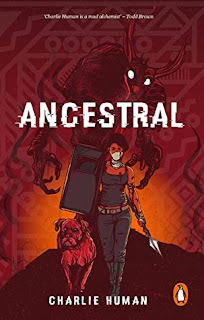
But this is no straightforward retrieval quest. The world in which Clementine immerses herself is dark and dysfunctional, the once-utopian, exclusive gated neighbourhood of Welcome Shade – now overrun by gangs. Not the kind of territory for the faint of heart. But then again, Clementine is a hard woman, made so by the upbringing of her strict Zulu grandfather who taught her the martial art of stick-fighting and the years of conflict in which she has been embroiled over the years.
As she travels further into uncertain, dangerous territory, she uncovers a far more sinister threat to mankind that is inextricably linked to her very blood and heritage, and she teams up with unlikely, unasked-for allies without whom she would not stand a gnat's chance in a windstorm for survival. Whether she likes it or not (and trust me, she doesn't) Clementine is a chosen one – a last bastion of hope for our species.
All in all, this is a fast-paced read – so much so that I sometimes felt the writing was a little rushed in places and could have used a little more depth. But then this might be down to my own personal preference, so if you disagree, don't mind me. There were moments where I wondered exactly how long a drone's batteries can last after heavy use without a recharge, but I won't spoil the story by worrying overly much about these sorts of details.
I do think this is the sort of tale that will no doubt appeal to folks who enjoy a good manga. Ancestral is fun, charges along at a breakneck pace, and offers a roller coaster ride of one untenable situation to the next, garnished with a healthy dollop of cosmic, insectoid horror.
November 29, 2021
A Kind of Magic: Making the Original Highlander by Jonathan Melville
Way, way back, in that delirious summer vacation between my primary and high school years, I watched a film that I'd best describe as pivotal in my development as an author and musician. The original 1986 Highlander, starring Christopher Lambert, Sean Connery, and Clancy Brown, lodged itself in my imagination, and taught me two things: fantasy is my calling, and Queen's music is the best.
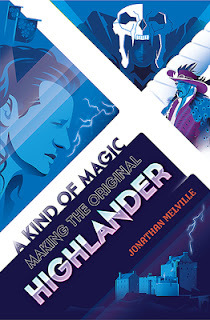
In A Kind of Magic: Making the Original Highlander, Jonathan Melville sets about the ambitious endeavour of chronicling the making of the film that sparked a cinema and TV franchise, accompanied by tie-in fiction and card games that have garnered a small but rabid fan following over the intervening decades.
It can be argued that the original Highlander has its flaws, yet for those of us who've comfort-watched it more than a score of times (yes, I'm one of those people who can say the lines before the actors even open their mouths), it's an immortal classic that provides a visual feast thanks to director Russell Mulcahy's savvy eye and the creative team that had his back. And of course, let's not forget the killer soundtrack developed by British rock band Queen and composer Michael Kamen.
Melville's legwork and interviewing skills result in deep dive into the process of how a film comes together, from the writing to pre-production, filming, and eventual distribution, as well as life beyond the big screen. For all the things that did go wrong (as it inevitably does in the production of any film), so much somehow came right. We get the good, the bad, and the ugly, as well as a fascinating glimpse behind the scenes into the unique pressures in the industry back in the 1980s. Knowing what I do of contemporary filmmaking thanks to my own involvement in the industry, exactly how cast and crew managed back then absolutely blows my mind.
I savoured every chapter of this book, and value it as an important artefact and time capsule of sorts to both entertain and inform those of us who have enjoyed this fantasy cult classic that's part-romance, part-historical adventure epic. This is one for the fans.
October 22, 2021
The Ape's Wife and Other Stories by Caitlín R Kiernan
The Ape's Wife and Other Stories by Caitlín R Kiernan has been sitting on my Kindle app for far too long, and I'm glad that I've finally gotten around to reading it – especially since some folks have drawn parallels between her writing and mine (why thank you). First off, as with all short story anthologies, whether single or multiple authors, this is a mixed bag. I gelled with some and not with others, and to go into a deep dive about each story is going to go beyond the scope of this review.
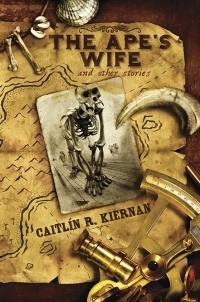
A diverse range of stories is showcased here, from steampunk-infused and somewhat Lovecraftian to plain old weird and re-envisionings of Beowulf told from a queer feminist perspective. I'm not going to go exhaustively into each, as I feel that will ruin the magic and mystery. What I will say is that if you're expecting neat, tidy endings with satisfying twists and likeable characters, maybe step away from this collection and go read Somerset Maugham or Saki.
Kiernan's prose is textured and tactile, and her tales often left me feeling out of sorts and scratchy behind the eyes – all hallmarks of good storytelling. This is not a book I'd recommend for anyone who's looking for comfort reading. I'd hazard to say that each story encapsulates a mood and a setting, and emphasis is mostly placed on emotion and engaging the senses to detriment of a tidy plot. And if that is what floats your boat, then hey, this will work for you. Kiernan doesn't shy away from characters who often maintain objectionable outlooks and opinions, so if you're easily triggered by casual racism and sexism, perhaps step away from this book, too. I feel I must add that some readers appear to be incapable of separating the author from their characters. [le sigh]
As a publishing professional, I feel I must point out that my edition was riddled with small typos of the kind that a savvy proofreader should have caught. I tend to overlook the odd dropped word here and there, but this volume could have done with a more thorough read through before it was published.
This anthology is disquieting and darkly atmospheric, and while not to everyone's tastes, is nevertheless a lovely dip into the writing of one of our important contemporary SFF authors.
October 15, 2021
Opinion: On Sarah and Jareth
This started out as a FB post but quickly mushroomed, and the thoughts here are, IMO, important for storytellers, so I'm saving them here.
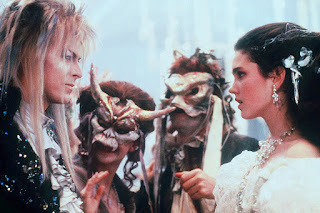
Today's bugaboo which has resulted in a mini blog post. I'm *so* tired of dudes explaining how Labyrinth, with a then-39yo David Bowie and -14yo Jennifer Connelly is basically child p**n in the same vein as Vladimir Nabokov's Lolita. Just stop already. I've heard this refrain so many times over the years.
Labyrinth is NOT Lolita.
And Connelly's memories of him are good. After his passing, she had this to say: "I think it's very sad, his passing, for so many reasons. To me, not only was he a genius, he was a genius who had the time to be kind. [That] was my experience of him.”
Here's my hot take: Jareth the Goblin King acts as an animus to Sarah's sexual awakening. And while there was implied sexual tension between the two characters, it was never followed through.
I always view what happens once Sarah steps over the threshold from our reality into Jareth's labyrinth to be some sort of dream-sequence. She enters a liminal space in which she comes to terms with the fact that she's no longer a child and must soon put away the things of her youth. This is a story about the dawn of sexual awakening.
Yes, Jareth's age makes one uncomfortable, but I believe it's *meant* to. In the beginning of the story, she externalises her power.
This line from Jareth is telling: Everything that you wanted I have done. You asked that the child be taken. I took him. You cowered before me, I was frightening. I have reordered time. I have turned the world upside down, and I have done it all for *you*! I am exhausted from living up to your expectations of me. Isn't that generous?
And until she learns her own true will, she is powerless, lost in a labyrinth of her own making, IMO, until she stands up to that mystery presented by Jareth.
She wins back everything by saying this: Through dangers untold and hardships unnumbered, I have fought my way here to the castle beyond the Goblin City to take back the child that you have stolen. For my will is as strong as yours, and my kingdom is as great... You have no power over me.
In terms of magical workings, this is pretty awesome stuff, and a film that had a massive impact on me when I watched it as a preteen. It's an initiatory fairy tale that still speaks deeply to me years later, it still has all its resonance, despite the dating of the SFX and soundtrack.
October 11, 2021
Silence of the Soleri (The Amber Throne #2) by Michael Johnston
Book one of The Amber Throne, Soleri, by Michael Johnston, got off to a promising start with an Egyptian-themed epic fantasy world, but unfortunately book two, Silence of the Soleri, didn't quite follow up. I feel that this can be attributed to there not being sufficient development for individual character arcs, in addition to a polarisation of the main arc.
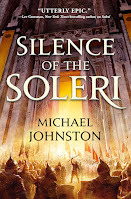
Johnston's writing is strong, but I feel that more stringent attention in the developmental edits could have helped lift this story out of the somewhat muddled novel that was eventually released. One good thing is that we didn't have any characters withholding key information as what happened in Soleri. Yet I do have a bone to pick with the mysteries of the Soleri themselves, that were left hanging by the end, which came off with a deus ex machina. Action sequences often felt rushed, with characters' motivations for their behaviour not clearly expressed, which marred the compelling world building for me somewhat.
I know it's awful making comparisons with other, more popular works, but I kept feeling as if these books were offering a serious nod to GRRM's ASoIaF, which wouldn't have been wholly unpleasant if individual character arcs were fully fleshed out.
There's not much else I can say, for fear of spoilers. Johnston has much to offer, and with an editor lending a stronger hand in the developmental stages, this novel could have been so much more. Also, I don't want to come down too hard, if there are more books to follow in the series, and this one is intended as middle book in a trilogy – in which case the loose threads will be picked up later.



